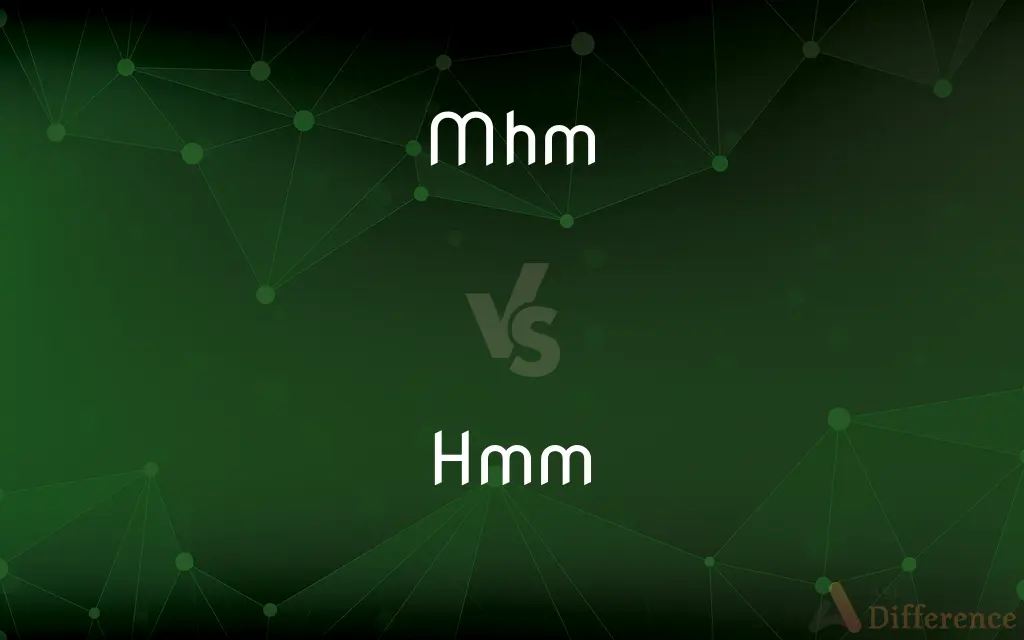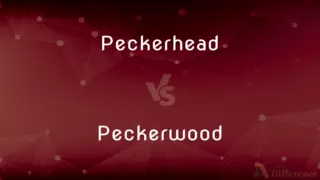Mhm vs. Hmm — What's the Difference?
By Tayyaba Rehman & Fiza Rafique — Updated on April 24, 2024
"Mhm" is an informal sound used to express agreement or acknowledgment, while "Hmm" is used to indicate thinking, hesitation, or a mild surprise.

Difference Between Mhm and Hmm
Table of Contents
ADVERTISEMENT
Key Differences
"Mhm" is often used in conversation as a verbal nod, signaling agreement, understanding, or confirmation without using more explicit words. It's akin to saying "yes" or "sure" and is commonly used in informal dialogues or casual communications. On the other hand, "Hmm" is typically used to express thoughtfulness or hesitation. It might signal that someone is pondering a question, considering options, or unsure about something.
While "Mhm" is a sound of affirmation, "Hmm" can introduce a pause in conversation, providing the speaker with a moment to think or indicating to the listener that deliberation is taking place. This difference fundamentally affects how each is used in dialogue, with "Mhm" moving a conversation forward on agreed terms, whereas "Hmm" might temporarily stall or deepen the discussion as more thought is given.
"Mhm" serves as an active listening tool, letting the other person know you are engaged and agree with what they are saying. Conversely, "Hmm" might be used to subtly express doubt or a need for more information before making a decision or forming an opinion.
Both "Mhm" and "Hmm" are non-committal in nature, but their implications differ; "Mhm" commits to an agreement, while "Hmm" reserves judgment, remaining non-committal until further notice. They are handy for maintaining the flow of conversation, each in its own way.
In writing, "Mhm" can be perceived as supportive or affirmative, making it suitable for informal texts or chats. In contrast, "Hmm" might come off as skeptical or inquisitive, useful in contexts where questioning or a thoughtful response is appropriate.
ADVERTISEMENT
Comparison Chart
Definition
An expression of agreement or confirmation
An expression of thought, hesitation, or curiosity
Tone
Affirmative and supportive
Reflective or questioning
Usage
To acknowledge or agree without elaboration
To indicate thinking or pause in conversation
Implication
Agreement or acceptance
Uncertainty or deliberation
Communication Type
Positive, confirms engagement
Neutral or skeptical, invites further discussion
Compare with Definitions
Mhm
A sound used to express agreement or confirmation.
Do you want to leave now? Mhm, let's go.
Hmm
Indicates thinking, hesitation, or reevaluation.
Hmm, I'm not sure if that's the best idea.
Mhm
Used in response to a question where no further elaboration is wanted or needed.
Was the movie good? Mhm!
Hmm
Used to express doubt or contemplation before making a decision.
Hmm, should I go or stay?
Mhm
An informal way to say "yes" or to agree with someone.
You agree with the plan? Mhm, completely.
Hmm
Signifies a pause in dialogue to consider the implications of what has been said.
Hmm, let me think about that.
Mhm
Expresses understanding or acknowledgement in conversation.
I need this report by tomorrow. Mhm, I’ll make sure it's done.
Hmm
Reflects mild surprise or interest in learning more.
Hmm, that’s an interesting point.
Mhm
Signals consent or approval in a relaxed or casual manner.
Can you help me with this? Mhm, no problem.
Hmm
A placeholder in conversation when searching for the right words.
Hmm, how should I explain this?
Mhm
Yes
Hmm
Used to express reflection, uncertainty, or hesitation
Hmm, interesting idea
Hmm, well I should probably get going
A coincidence? Hmm
Hmm
Indicating thinking or pondering.
Hmm... that's an interesting idea.
Hmm... I just can't decide between the two.
Hmm... creation or evolution? That’s the big question.
Hmm
A demand for an answer to a question.
Just where were you until 2 a.m.? Hmm?
Hmm
(intransitive) To make a thoughtful humming noise.
Common Curiosities
Is "Mhm" a universal sound of agreement?
Yes, "Mhm" is widely recognized as a non-verbal sound expressing agreement or affirmation.
Can "Hmm" indicate disapproval?
"Hmm" can subtly suggest disapproval or skepticism, depending on the context and tone of the conversation.
Are "Mhm" and "Hmm" considered professional expressions?
While generally informal, "Mhm" can be professional in casual business communications. "Hmm" might be used professionally in brainstorming sessions or discussions.
Do "Mhm" and "Hmm" carry the same emotional weight?
No, "Mhm" is typically lighter and positive, indicating agreement, whereas "Hmm" can carry a heavier, more contemplative tone.
Can "Hmm" be offensive in any way?
If perceived as dismissive or overly skeptical, "Hmm" could potentially be taken negatively, especially if the context isn’t clear.
What is the best scenario to use "Mhm" over "Hmm"?
Use "Mhm" when you want to show agreement or confirmation quickly and succinctly. Use "Hmm" when you need to pause or think over something discussed.
Can "Hmm" indicate interest?
Yes, "Hmm" can indicate a piqued interest or curiosity, often prompting further inquiry or discussion.
How should I use "Mhm" and "Hmm" in written communication?
Use "Mhm" for affirmative responses and "Hmm" for expressing thought or hesitation. Be mindful of the tone and context to ensure the intended meaning is conveyed.
Is it appropriate to use "Mhm" in formal emails?
It’s best to avoid "Mhm" in formal emails, opting instead for clear affirmative words like "yes" or "certainly" to maintain professionalism.
Which is more versatile in conversation, "Mhm" or "Hmm"?
"Hmm" is more versatile as it can express a range of thoughts from doubt to curiosity, while "Mhm" is specifically for agreement.
Share Your Discovery

Previous Comparison
Glutinous vs. Glutenous
Next Comparison
Peckerhead vs. PeckerwoodAuthor Spotlight
Written by
Tayyaba RehmanTayyaba Rehman is a distinguished writer, currently serving as a primary contributor to askdifference.com. As a researcher in semantics and etymology, Tayyaba's passion for the complexity of languages and their distinctions has found a perfect home on the platform. Tayyaba delves into the intricacies of language, distinguishing between commonly confused words and phrases, thereby providing clarity for readers worldwide.
Co-written by
Fiza RafiqueFiza Rafique is a skilled content writer at AskDifference.com, where she meticulously refines and enhances written pieces. Drawing from her vast editorial expertise, Fiza ensures clarity, accuracy, and precision in every article. Passionate about language, she continually seeks to elevate the quality of content for readers worldwide.















































